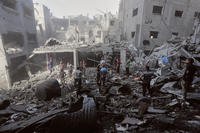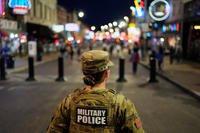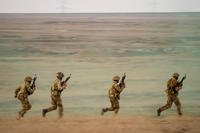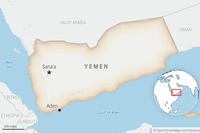As winter comes to eastern Europe, Ukrainian forces backed by the U.S. and its allies -- and replete with winter gear poured into the country as national security aid -- have the upper hand on Russia and its invasion force, Defense Secretary Lloyd Austin said Wednesday.
The government in Kyiv, once considered the underdogs, is now militarily positioned to keep Russia on its heels through the hardest fighting season, Austin said during a press conference at the Pentagon following a meeting with allies supporting Ukraine.
Russian forces have been suffering munitions shortages and supply line troubles since the beginning of the war, a situation that has only gotten worse as Ukrainian forces have successfully reclaimed large blocks of territory, at times overrunning Russian lines.
Read Next: 60 Junior ROTC Instructors Accused of Sexual Misconduct in Past Five Years, Investigation Finds
Still, the fighting over whether Ukraine will remain sovereign and whole or Russian President Vladimir Putin will keep or seize its territory is expected to grind on through the winter, as Moscow continued to pound civilian infrastructure with missiles this week in attacks that have left one-quarter of Ukrainians without power amid the growing cold. The fighting spilled over the Poland border as errant air defense missiles, likely fired by Ukraine against a Russian attack, killed two people Tuesday.
"I think Ukrainians will have the upper hand in this fight as we have right now, but they will continue to maintain the upper hand when we get to winter, just like we saw them operate in February," Austin said. "Russia on the other hand, I mean, they're fighting in a foreign country, the Ukrainians have challenged their supply lines. It will be difficult for them to get the kinds of gear into their troops that they need to be able to fight effectively."
The latest $400 million U.S. security aid shipment announced by the Pentagon on Nov. 10 includes cold weather protective gear for the Ukrainians, and other countries have also been busy providing the seasonal supplies. Over the weekend, Canada announced it was sending $15 million worth of parkas, pants, boots and other winter clothing, according to media reports.
The gear comes on top of more than $18 billion in continued U.S. weapons and security aid, including air defense systems to counter the Russian infrastructure strikes, Stinger missiles, and High Mobility Artillery Rocket Systems, or HIMARS.
Austin said the National Advanced Surface-to-Air Missile Systems, or NASAMS, that the U.S. recently ordered and sent to Ukraine are fully operational. "Their performance so far has been very impressive. Basically, our systems had a 100% success rate in intercepting Russian missiles," he said.
On Tuesday, Russia launched what appears to be its largest onslaught of missiles since the beginning of the war, according to Gen. Mark Milley, the Joint Chiefs chairman, who spoke at the press conference with Austin. The assault was waged throughout Ukraine with at least 60 missiles -- and possibly nearly twice that number -- targeting civilian infrastructure with no military role.
"These missiles, again, they targeted intentionally and damaged civilian power generation facilities to cause unnecessary suffering with the civilian population," Milley said. "With the onset of winter, families will be without power and, more importantly, without heat, basic human survival and subsistence is going to be severely impacted and human suffering for the Ukrainian population is going to increase."
Poland, a NATO member, said Tuesday that the missile strike within its border with Ukraine appeared to be unintentional and likely was launched by Ukraine in an attempt to fend off the Russian attack on its power grid. The missile hit farmland and killed two people. Austin said the U.S. assessment so far backed up Poland's description but that the deaths were still being investigated.
Meanwhile, the winter weather and mud are making military movements in Ukraine more difficult, and the battle lines from Kharkiv in eastern Ukraine to Kherson in the south are beginning to stabilize as part of an expected slowing of operations, according to Milley.
The ground is likely to freeze in the cold months of January and February, and fighting could again intensify as movement becomes easier. Milley took criticism for earlier comments suggesting a winter lull in fighting could give Ukraine and Russia an opening for peace negotiations, but he stood by the assessment Wednesday.
"The Russian military is really hurting bad. So, you want to negotiate at a time when you're at your strength and your opponent is at weakness, and it's possible maybe there'll be a political solution," Milley said. "All I'm saying is there's a possibility for it. That's all I'm saying."
Moscow has suffered high casualties in the war, prompting Putin to call up reserve forces, and it has lost a "tremendous" amount of tanks, infantry fighting vehicles, fighter aircraft and helicopters, Milley said.
Sanctions have also hobbled Russia from replenishing its stocks of precision-guided missiles because it can't get key materials such as microchips, and building up supplies to the levels before its invasion could take years, Austin said.
"We have seen them struggle with having enough munitions to fight the way that they want to fight so they're reaching out to Iran or reaching out to North Korea," Austin said. "I do think that those countries will probably provide them some capability. And so for that reason, I don't think this will be over anytime soon."
-- Travis Tritten can be reached at travis.tritten@military.com. Follow him on Twitter @Travis_Tritten.
Related: Poland, NATO Say Missile Strike Wasn't a Russian Attack















